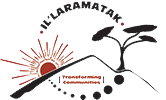
Il’laramatak Community Concerns (ICC)
Joined June 2015
Il’laramatak is a Maasai word meaning “care-giver.”Maasai are the “care-givers” of the grazing land throughout Kenya. ICC is care-giver of the pastoralist community’s concerns regarding human rights.
Il’laramatak Community Concerns (ICC), a registered Non Governmental Organization (NGO), was founded in September 2011, with the aim of addressing human rights and development concerns of Maasai pastoralist women and girls.
Pastoral women and girls face double marginalization first being from retrogressive cultural practices that violate their basic human rights, demeaning their value to lesser human as well as denying them opportunities to realize their full potential and worth. Second marginalization is from Government and leadership through policy gaps, access to leadership positions and unequal resource distribution.
While we recognize the gains that the new Kenyan Constitution has brought to women, it is evident that much more efforts is still needed to make sure they enjoy these rights. Women and girls continue to survive practices like Female Genital Mutilation, early forced marriages, no right to own land and other economic resources, access to leadership positions; both political and non political to mention but a few.
It’s against this background that Agnes Leina the Founder and Director of Il’laramatak who herself is from the pastoral communities decided to establish this organization to empower women to break the silence, know and demand their rights. ICC engages men to enable women and girls make choices about the way that they want their lives and that of the community to have a bright future. Il’laramatak came to light by indigenous people and brings pastoral professionals to engage in advocating for women and girls empowerment, develop their capacities in a participatory approach by all levels of the community for a prosperous future.
ICC is aimed to tackle girls access, retention and transition from primary to secondary level education, creates opportunities for income generating projects for women, advocate for inclusion of women in leadership and decision making positions, reduce level of poverty and contribute to National development goals.
